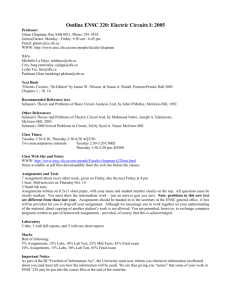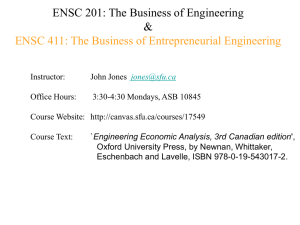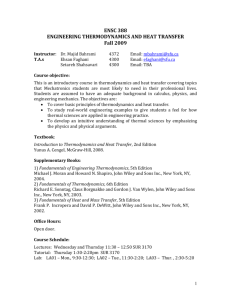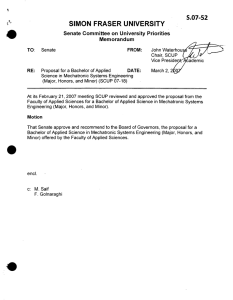ENSC 461 ENERGY CONVERSION Spring 2011
advertisement
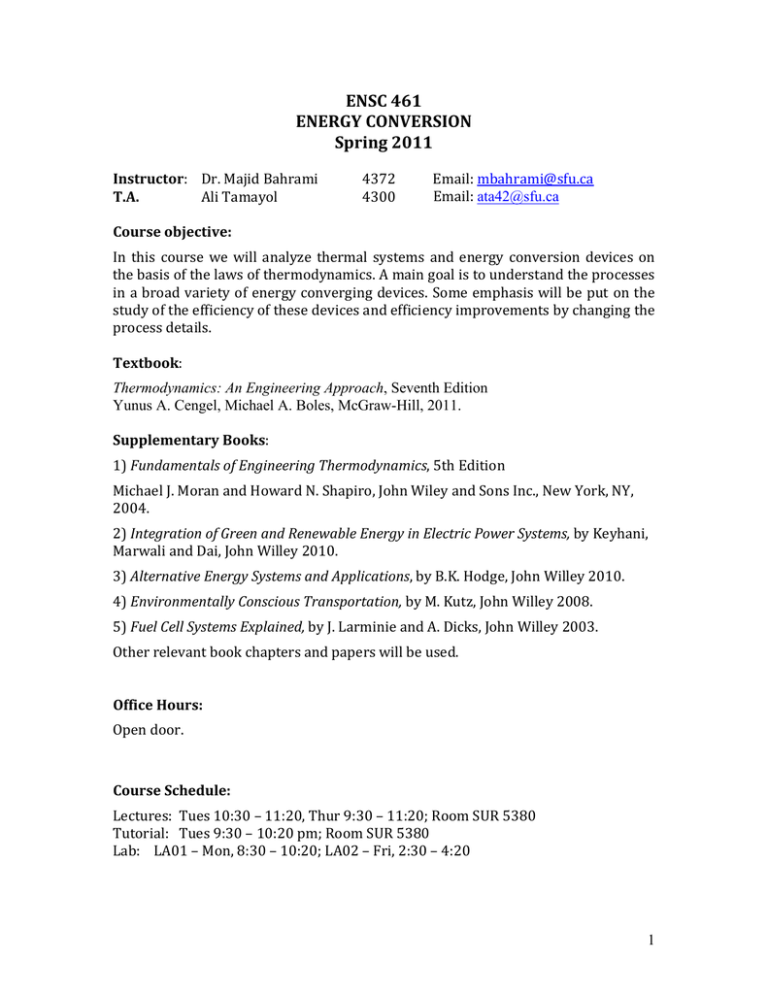
ENSC 461 ENERGY CONVERSION Spring 2011 Instructor: Dr. Majid Bahrami T.A. Ali Tamayol Course objective: 4372 4300 Email: mbahrami@sfu.ca Email: ata42@sfu.ca In this course we will analyze thermal systems and energy conversion devices on the basis of the laws of thermodynamics. A main goal is to understand the processes in a broad variety of energy converging devices. Some emphasis will be put on the study of the efficiency of these devices and efficiency improvements by changing the process details. Textbook: Thermodynamics: An Engineering Approach, Seventh Edition Yunus A. Cengel, Michael A. Boles, McGraw-Hill, 2011. Supplementary Books: 1) Fundamentals of Engineering Thermodynamics, 5th Edition Michael J. Moran and Howard N. Shapiro, John Wiley and Sons Inc., New York, NY, 2004. 2) Integration of Green and Renewable Energy in Electric Power Systems, by Keyhani, Marwali and Dai, John Willey 2010. 3) Alternative Energy Systems and Applications, by B.K. Hodge, John Willey 2010. 4) Environmentally Conscious Transportation, by M. Kutz, John Willey 2008. 5) Fuel Cell Systems Explained, by J. Larminie and A. Dicks, John Willey 2003. Other relevant book chapters and papers will be used. Office Hours: Open door. Course Schedule: Lectures: Tues 10:30 – 11:20, Thur 9:30 – 11:20; Room SUR 5380 Tutorial: Tues 9:30 – 10:20 pm; Room SUR 5380 Lab: LA01 – Mon, 8:30 – 10:20; LA02 – Fri, 2:30 – 4:20 1 Course Outline: The following provide a list of topics to be covered in this course: Week 1: Review Week 2: Entropy and exergy Week 3: Power cycles, Otto and Diesel Week 4: Gas turbine power plants and air craft propulsion Week 5: Liquid‐vapor mixtures, vapor power systems Week 6: Steam cycles Week 7: Refrigeration cycles and heat pumps Week 8: Mixtures, psychrometrics Week 9: Psychrometrics charts and fundamentals of heating, ventilating, air conditioning (HVAC) Week 10: Fundamentals of combustion Week 11: Introduction on sustainable and renewable energy resources including: wind, wave energy conversion devices, and fuel cell technologies Week12: Introduction on energy storage devices Course Webpage: http://www.sfu.ca/~mbahrami/ENSC 461.htm Tutorials: Selected problems will be solved and questions about lecture material or assignments will be answered in tutorials. Individual help will be given. Laboratory: There will be one laboratory exercise for this course. Lab information is posted on the website. Laboratory report requirements, background and a lab schedule will be made available in the second week of term. During the lab period, students will work in groups as assigned. Experiment: Diesel Engine Assessment: Projects Lab Reports Midterm Final 20% 5% 30% 45% The midterm and final are closed book examinations of the course material. However, you are permitted to use a photocopy of unit conversion tables from the textbook plus a crib sheet consisting of one side of one 8 1/2× 11 sheet of paper. The preparation of a well‐structured crib sheet will help during the testing of ENSC 461 2 but it will also help in the preparation for exams as you assign priority to what is and is not important. Each week an assignment of 1 or 2 problems along with several suggested problems will be posted online. It is highly recommended that you work out the suggested problems and the assignments. There will be at least two pop quizzes during the semester, with bonus marks. The pop quizzes will be selected from the assignments and the suggested problems posted on the course webpage. The final numerical score will be transferred to a letter grade following the Letter Grading Scheme described in the University Calendar. Project: Topics in Renewable/Sustainable Energy Conversion An engineering design project will be assigned throughout the term. Projects must be completed in group. An engineering report should be prepared and the results should be presented in the class. All projects must be handed in immediately following the lecture period on the Due Date. No extensions will be granted. Failure to hand the project in on time will result in a grade of zero. Assigned Date: TBA Due Date: TBA Grade: 20% 3

